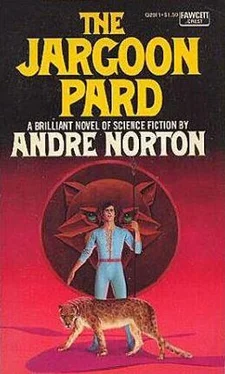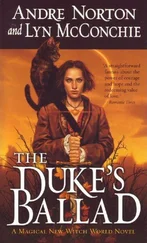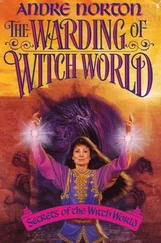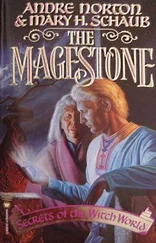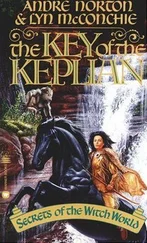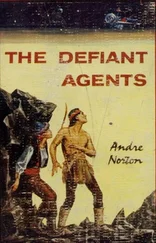Andre Norton - The Jargoon Pard
Здесь есть возможность читать онлайн «Andre Norton - The Jargoon Pard» весь текст электронной книги совершенно бесплатно (целиком полную версию без сокращений). В некоторых случаях можно слушать аудио, скачать через торрент в формате fb2 и присутствует краткое содержание. Жанр: Фэнтези, на английском языке. Описание произведения, (предисловие) а так же отзывы посетителей доступны на портале библиотеки ЛибКат.
- Название:The Jargoon Pard
- Автор:
- Жанр:
- Год:неизвестен
- ISBN:нет данных
- Рейтинг книги:4 / 5. Голосов: 1
-
Избранное:Добавить в избранное
- Отзывы:
-
Ваша оценка:
- 80
- 1
- 2
- 3
- 4
- 5
The Jargoon Pard: краткое содержание, описание и аннотация
Предлагаем к чтению аннотацию, описание, краткое содержание или предисловие (зависит от того, что написал сам автор книги «The Jargoon Pard»). Если вы не нашли необходимую информацию о книге — напишите в комментариях, мы постараемся отыскать её.
The Jargoon Pard — читать онлайн бесплатно полную книгу (весь текст) целиком
Ниже представлен текст книги, разбитый по страницам. Система сохранения места последней прочитанной страницы, позволяет с удобством читать онлайн бесплатно книгу «The Jargoon Pard», без необходимости каждый раз заново искать на чём Вы остановились. Поставьте закладку, и сможете в любой момент перейти на страницу, на которой закончили чтение.
Интервал:
Закладка:
The Jargoon Pard
Andre Norton
1
Of Gunnora’s Shrine and What Chanced There in the Year of the Red Bear
Many are the chronicles of Arvon, for that is a land old beyond the imaginings of men, even though those men may be born of the Elder Races and, therefore, long in their own lives. Some tales are near forgotten, so that a song-smith has but bits and patches of them caught in memory. Others are new forged and detailed. For in a land where the Power is known and used, then marvels do follow after, as the long-fleeced sheep of the Dales follow close upon the piping of their shepherd.
There is much in Arvon pertaining to the Seven Lords and those who ruled before them that is lost, though their judging still lies active in the land. Even those who can wield the Power do not know all, nor ever will.
Who was Gunnora? Was she once a Wise Woman of such stature in the land that after her passing some spoke of her as never having been flesh, but spirit alone? If so—that part of the truth is long befogged. But that Gunnora’s influence remains, that all womankind knows, to take heart in. For she is the one whose sign is a sheaf of ripe grain bound together with fruit of the vine ready for the plucking. It is Gunnora’s amulet each maid wears, upon which she lays her hand at the moment that she conceives, and that she will hold tightly when the time of childbirth is upon her.
To Gunnora’s shrine came those for whom doubtful runes have been cast, that in her sanctuary they may be cured of barrenness, or else have an easier time of child-bearing. And that she has power within the matter of healing, all will testify.
Thus, at Gunnora’s shrine, begins the chronicle of Kethan—or if I speak less like a songsmith and more in the common tongue of the land—my own story. Yet the truth of what happened within that shrine at my birthing was a long time hid and held secret. At last only sorcery wrested it forth into the light of day and the full knowledge of men.
It was the custom of the Four Clans—Redmantle, Gold-mantle, Bluemantle and Silvermantle—that inheritance follows the old ways. Thus a man’s son does not succeed him in leadership, no, rather the son of his full sister does she bear a boy child. For it be the blood of the women of the Clan that is reckoned the truest by descent. In the House of the Car Do Prawn, she who would provide the heir was the Lady Heroise.
Though her brother, the House Lord, Erach, had wed early, having already a son, Maughus, and a daughter, Thaney (yet an infant in her cradle), Heroise showed no inclination to take any man to her chamber. She was a woman fiercely proud, with a small talent for the Power. As a young maid she had studied with the Wise Women of Garth Howel, bringing one of their number, Ursilla, with her to Car Do Prawn when summoned to return.
The idea was firm in her mind that she should, in time, bear a son to take the chieftain’s chair. To the shaping of that son, mind and body, she must bend every care, so that when the day arrived that he was shield-raised by the men-at-arms, and his name shouted to the four corners of the Great Hall, it would be her will that would govern all his actions. And in this project she had the alliance of Ursilla, with all the knowledge of her calling.
Who was the father of the child she carried in the early spring of the Year of the Red Boar no one could name. It was accepted as her right to choose such in temporary alliance only, if that was her wish. Stories were whispered behind hands that her mate was of Ursilla’s providing, but it was best not to inquire too deeply into his beginnings lest that be uncovered which would make the coming heir less—or perhaps—more than human. For heir, Heroise was certain, her child would be. And in this Ursilla also gave her assurance.
In the Month of Snowbird, the Lady Heroise and her women, together with Ursilla, traveled to Gunnora’s shrine, for the Wise Woman, Ursilla, had cast a foretelling that troubled her. Her uneasiness alarmed Heroise in turn, so that she determined to have all the help she could call upon that the result of all her planning would match her consuming desire. Thus by easy stages, for ragged sweeps of snow still lay upon the ground (though the hint of coming spring was in the air at midday at least), they came to the shrine.
Gunnora has no priestesses nor shrine attendants. Those who seek her out come into a Presence that they may sense but never see. Thus they were met by no one of their own kind. But in the stabling, a little distance from the shrine, were two horses, while in the outer court a man paced like a great caged cat up and back, up and back, since he dared not enter the inner chamber, which was Gunnora’s alone.
The stranger glanced at Heroise as she came in, walking awkwardly because of the clumsy bulk of her swollen body. Then he turned away quickly, as if he feared that he did a discourteous thing. So he did not note that Ursilla gave him a long, measuring glance as they passed him by, and that a faint frown crossed the Wise Woman’s face, as if she had touched upon the edge of some troubling thought.
But she had no time now for any other save her charge, for it seemed that the Lady Heroise had miscalculated her time, and her pains were already upon her. She settled in one of the small inner rooms, only Ursilla, as a Wise Woman, attending her, the other women awaiting without.
There was a languorous scent upon the air, as if the flowers of late summer bloomed in abundance, and it seemed to the Lady Heroise that she drifted among the beds of a great garden. She knew pain, but that was a far-off thing, which had no tie with her body and meant nothing. Rather in her now worked a great joy, such as in her cold and devious mind she had never known before.
Nor was she aware that in a neighboring chamber of the shrine rested another woman and with her one of the Wise Women from the neighboring village. She, too, dreamed joyfully, awaiting a child to fill her arms as love for it already filled her heart.
Nor were either aware of the storm that gathered, though the man, who paced and waited, went to the outer doorway and stared at the black massing of clouds overhead, regarded the clouds anxiously and shivered. It seemed to him that, though he knew all the humors of nature well and through many years, the brooding stillness under the dark roof now stretched over the land was not quite like anything he had seen before. Because of his own nature, he was alert to forces that were not of the Arvon of men, but the Arvon of Power. Perhaps now that Power was about Of Gunnora’s Shrine to manifest itself in some fashion that was a threat to all below.
His hands went to his belt, and he ran his fingertips questioningly along it, as if he sought something there that was no longer his to find. But his chin was up, as he eyed the clouds, and what he half-believed might move them so, with a grim defiance. His clothing was plain, a brown sleeveless jerkin over a shirt of forest green. His cloak lay behind within the court. On his feet, the boots of a horseman were dull brown, the breeches above them green.
Yet there was that about him which said he was no field man, nor even chief of some small and unimportant holding, such as his garb suggested. His dark hair was thick and grew in a peak upon his forehead, and his eyes were strange in his weather-browned face—for they were a tawny yellow, like unto the eyes of some great cat. Anyone glancing at him once might well turn to look again, drawn by his air of authority, as if here stood one who answered only to his own will.
Now his lips shaped words, but he did not utter them aloud. His hand rose from his belt to make a small sign in the open air. At that moment there came a great neighing cry from the stable. The stranger turned swiftly—though he could not see around the corner of the building. At a repetition of that cry he darted back, caught up his cloak, and was off toward the horses he had earlier stabled.
Читать дальшеИнтервал:
Закладка:
Похожие книги на «The Jargoon Pard»
Представляем Вашему вниманию похожие книги на «The Jargoon Pard» списком для выбора. Мы отобрали схожую по названию и смыслу литературу в надежде предоставить читателям больше вариантов отыскать новые, интересные, ещё непрочитанные произведения.
Обсуждение, отзывы о книге «The Jargoon Pard» и просто собственные мнения читателей. Оставьте ваши комментарии, напишите, что Вы думаете о произведении, его смысле или главных героях. Укажите что конкретно понравилось, а что нет, и почему Вы так считаете.
